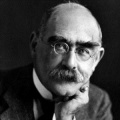
Joseph Rudyard Kipling (30 December 1865, Bombay) was an English novelist, poet and short-story writer.
Rudyard Kipling was born in Bombay, India, the son of John Lockwood Kipling, a Professor at the local school of art, and Alice (MacDonald) Kipling. The name Rudyard is believed to be in honour of the English lake Rudyard, where his parents met. The early years were very happy for the future writer and full of exotic sights and sounds of India.But at the age of 5, together with his sister, he goes to study in England. For 6 years, he lived in a private boarding house, the owner of which (Madame Rosa) mistreated him, punished him. This attitude affected him so much that he suffered from insomnia for the rest of his life.
At the age of 12, his parents arrange for him to attend a private Devon school so that he can then enter the prestigious military Academy. The principal was Cormell Price, a friend of Rudyard's father. It was he who encouraged the boy's love of literature. Myopia did not allow Kipling to choose a military career, and the school did not give diplomas for admission to other universities.
Impressed by the stories he wrote at the school, his father finds him a job as a journalist in the editorial office of «The Civil and Military Gazette», published in Lahore (British India, now Pakistan). In October 1882, Kipling returned to India and began working as a journalist. In his spare time, he writes short stories and poems, which are then published by the newspaper along with reports. The work of a reporter helps him to better understand the various aspects of the colonial life of the country. The first sales of his works begin in 1883.
In the mid-80s, Kipling began travelling to Asia and the United States as a correspondent for the Allahabad newspaper "pioneer", with which he signed a contract to write travel essays. The popularity of his works is rapidly increasing, in 1888 and 1889, 6 books were published with his stories, which brought him recognition. In 1889, he made a long trip to England, then visited Burma, China, and Japan. He travels across the United States, crosses the Atlantic ocean, and settles in London.
He is beginning to be called the literary heir of Charles Dickens. In 1890, his first short story «The Light went out» was published. The most famous poems of that time are «The Ballad of East and West», as well as «The Last Rhime of True Thomas».
In London, he meets a young American publisher, Wolcott Balestier, and they work together on the novel "Naulahka". In 1892 Balestier died of typhus, and soon after that Kipling married his sister Carolina. During the honeymoon, the bank in which Kipling had savings went bankrupt. The money the couple had left only to get to Vermont (USA).
They live here for the next four years. At this time, the writer again begins to write for children; in 1894-95, the famous The Jungle Book and The Second Jungle Book were published. The poetry collections «The Seven Seas» and «The white thesis» have also been published. Soon two children are born: Josephine and Elsie. After a quarrel with his brother-in-law, Kipling and his wife returned to England in 1896. In 1897, the novel «Captains Courageous» was published. In 1899, during a visit to the United States, his eldest daughter Josephine died of pneumonia, which was a huge blow for the writer. In 1899, he spends several months in South Africa, where he meets Cecil Rhodes, a symbol of British imperialism. In 1901, the novel «Kim» was published, which is considered one of the best novels of the writer.
In Africa, he begins to select material for a new children's book, which is published in 1902 under the title «Just So Stories». In the same year, he buys a country house in Sussex (England), where he remains for the rest of his life. Here he writes his famous books «Puck of Pook's Hill» and «Rewards and Fairies» – fairy tales of Old England, united by the narrator-elf puck, taken from Shakespeare's plays.
In 1907, Kipling became the first Englishman to receive the Nobel prize in literature. In the same year, he received awards from the universities of Paris, Strasbourg, Athens and Toronto; he was also awarded honorary degrees from Oxford, Cambridge, Edinburgh and Durham universities. The rich language of Kipling's works, full of metaphors, made a great contribution to the Treasury of the English language.
Literary activity is becoming less saturated. Another blow for the writer was the death of his eldest son John in the WWI in 1915. Kipling and his wife worked in the Red Cross during the war. After the war, he became a member of the war graves commission. It was he who chose the biblical phrase "Their names will live forever" on the obelisks of memory. During one trip in 1922 to France, he met the English king George V, with whom he later formed a great friendship. The last days of the writer Kipling continued his literary activity until the early 30s, although success accompanied him less and less. Since 1915, the writer suffered from gastritis, which later turned out to be an ulcer. Rudyard Kipling died of a traumatic brain haemorrhage on January 18, 1936, in London. He is buried in Poets' Corner in Westminster Abbey.
Nazira Artykbayeva, librarian of the International Book Department

